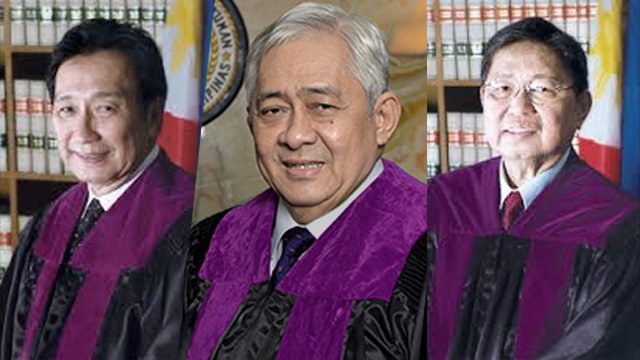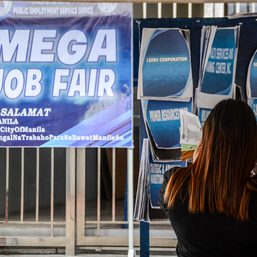SUMMARY
This is AI generated summarization, which may have errors. For context, always refer to the full article.

MANILA, Philippines – The Supreme Court (SC) on Wednesday, April 22, disclosed what motivated judges to inhibit from the petition involving Makati Mayor Erwin Jejomar “Junjun” Binay Jr’s suspension.
A day after the High Tribunal announced the inhibitions of 3 more judges, the SC, in a media brief sent out to reporters, outlined the reasons why Associate Justices Presbitero Velasco Jr, Arturo Brion, and Francis Jardeleza chose to no longer participate in the high-profile case.
The petition they no longer have to decide on was filed by Ombudsman Conchita Carpio Morales – herself a former SC Associate Justice – against the Court of Appeals (CA) and Binay Jr.
Morales argued that the CA temporary restraining order and subsequent writ of preliminary injunction stopping her ordered 6-month suspension of Binay unlawfully clipped the Ombudsman’s powers. (READ: SC justices shed light on Ombudsman’s power to probe)
She regarded the CA’s move – prompted by Binay’s plea – as “unwarranted intervention in what should have otherwise been a regular administrative proceeding” and a “violation of the constitutionally-guaranteed independence of the Office of the Ombudsman.”
Reasons cited
Supposed to pen the decision on the petition, Jardeleza inhibited as “his previous participation as Solicitor General in a pending case before the Court may affect his participation in the current case,” the SC said.
On the other hand, Brion’s wife is “a confidential attorney in the chambers of one of the respondent Justices [of the CA] in this case.”
Binay Jr’s mother Elenita faces multiple cases of graft and malversation before the anti-graft court Sandiganbayan for alleged anomalous government purchases of hospital equipment during her time as Makati mayor.
Out on bail, she has challenged these cases before the SC.
Given his previous inhibition, Velasco felt that “his continued participation in the case of the younger Binay “might create a misimpression of bias,” said the SC.
The justice “maintains that he does not know nor has he even met respondent Mayor Jejomar Erwin Binay and his previous recusation in the case involving the Mayor’s mother was not due to his relation to Dr Binay but that he knew one of the parties in the earlier case,” read the brief.
Effect of inhibitions
Previously, Associate Justice Diosdado Peralta had already inhibited from the case and did not participate in the first round of oral arguments.
This leaves 11 justices voting on the high-profile case against the Makati mayor, who argued that his suspension was issued by the Ombudsman with grave abuse of discretion.
This also means that Jardeleza would have to be replaced as the justice who will pen the decision on the Ombudsman petition.
SC Spokesman Theodore Te did not disclose the justices’ reasons during the scheduled press briefing on Tuesday, April 21, when the 3 justices’ recusals were announced. (READ: Jardeleza, 2 other justices inhibit from Junjun Binay case)
During the first round of oral arguments, the 3 justices who recently disqualified themselves from the Binay case still participated in questioning Morales’ camp.
Velasco even questioned Morales on whether her 6-month suspension order against Binay was issued in haste.
On Tuesday, Te explained that their initial participation would have no effect on the final decision of the case, as their votes will not be counted anyway.
Judicial conduct
Voluntary inhibitions are an exercise of good judicial conduct on the part of judges in cases where their “impartiality might be reasonably questioned.”
Under Rule 137 of the Rules of Court, “a judge may, in the exercise of his sound discretion, disqualify himself from sitting in a case.”
|
Section 1, Rule 137 of the Rules of Court reads: “Section 1. Disqualification of judges. — No judge or judicial officer shall sit in any case in which he, or his wife or child, is pecuniarily interested as heir, legatee, creditor or otherwise, or in which he is related to either party within the sixth degree of consanguinity or affinity, or to counsel within the fourth degree, computed according to the rules of the civil law, or in which he has been executor, administrator, guardian, trustee or counsel, or in which he has been presided in any inferior court when his ruling or decision is the subject of review, without the written consent of all parties in interest, signed by them and entered upon the record. A judge may, in the exercise of his sound discretion, disqualify himself from sitting in a case, for just or valid reasons other than those mentioned above.” Likewise, Rule 3.12 of the Code of Judicial Conduct reads: “Rule 3.12 – A judge should take no part in a proceeding where the judge’s impartiality might reasonably be questioned. These cases include among others, proceedings where: (a) the judge has personal knowledge of disputed evidentiary facts concerning the proceeding; (b) the judge served as executor, administrator, guardian, trustee or lawyer in the case or matter in controversy, or a former associate of the judge served as counsel during their association, or the judge of lawyer was a retrial witness therein; (c) the judge’s ruling in a lower court is the subject of review; (d) the judge is related by consanguinity or affinity to a party litigant within the sixth degree or to counsel within the fourth degree; (e) the judge knows the judge’s spouse or child has a financial interest, as heir, legatee, creditor, fiduciary, or otherwise, in the subject matter in controversy or in a party to the proceeding, or any other interest that could be substantially affected by the outcome of the proceeding. In every instance, the judge shall indicate the legal reason for inhibition.” |
Before being appointed to his present post, Jardeleza had acted as the government’s lawyer.
In one of his petitions before the SC as then solicitor-general, he had argued for the abandonment or review of the condonation doctrine, a legal defense the Binay camp now invokes against the Ombudsman.
The Binay camp argues that Morales committed grave abuse of discretion when she issued the suspension order without considering the doctrine.
In a supplemental petition before the SC, Morales argued that she was not bound by the doctrine this early in a proceeding. (READ: Binay reelection not an argument vs suspension – Ombudsman)
In a prior interview, she further explained that such a doctrine goes against the 1987 Constitution’s premium on public accountability – a view shared by the top two officials of the Philippine judiciary. – Rappler.com
Add a comment
How does this make you feel?
![[PODCAST] Teach Me, Senpai, E12: Travel writing and freelancing with Kara Santos](https://www.rappler.com/tachyon/2024/04/teach-me-senpai-ls-guest.jpg?resize=257%2C257&crop=455px%2C0px%2C1080px%2C1080px)

![[PODCAST] Teach Me, Senpai, E8: Illustrating and freelancing with Raxenne Maniquiz](https://www.rappler.com/tachyon/2023/12/teach-me-senpai-ls-guest.jpg?resize=257%2C257&crop=459px%2C0px%2C1080px%2C1080px)
![[PODCAST] Teach Me, Senpai, E7: Tattoos and illustrations with Wiji Lacsamana](https://www.rappler.com/tachyon/2023/11/tms-lacsamana-ls-optimized.jpg?resize=257%2C257&crop_strategy=attention)
![[PODCAST] Teach Me, Senpai, E6: Thrifting and vintage clothing with Season Pass](https://www.rappler.com/tachyon/2023/11/teach-me-senpai-ls-guest.jpg?resize=257%2C257&crop=460px%2C0px%2C1080px%2C1080px)
There are no comments yet. Add your comment to start the conversation.